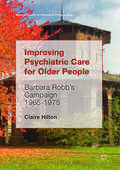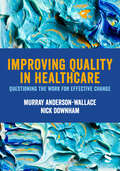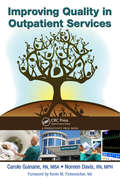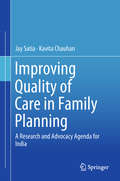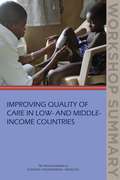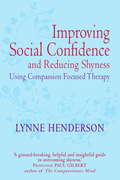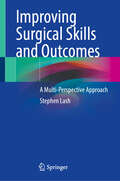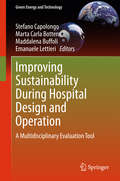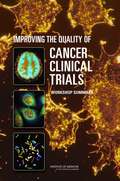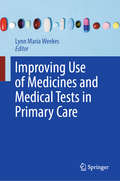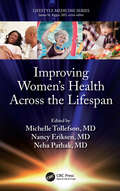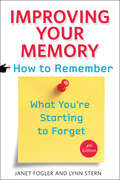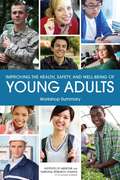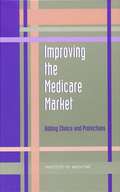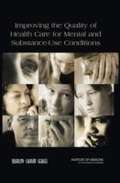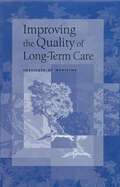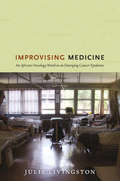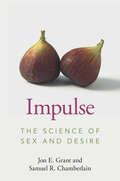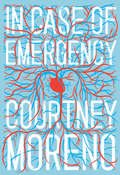- Table View
- List View
Improving Psychiatric Care for Older People
by Claire HiltonThis book is open access under a CC BY 4. 0 license. This book tells the story of Barbara Robb and her pressure group, Aid for the Elderly in Government Institutions (AEGIS). In 1965, Barbara visited 73-year-old Amy Gibbs in a dilapidated and overcrowded National Health Service psychiatric hospital back-ward. She was so appalled by the low standards that she set out to make improvements. Barbara's book Sans Everything: A case to answer was publicly discredited by a complacent and self-righteous Ministry of Health. However, inspired by her work, staff in other hospitals 'whistle-blew' about events they witnessed, which corroborated her allegations. Barbara influenced government policy, to improve psychiatric care and health service complaints procedures, and to establish a hospitals' inspectorate and ombudsman. The book will appeal to campaigners, health and social care staff and others working with older people, and those with an interest in policy development in England, the 1960s, women's history and the history of psychiatry and nursing.
Improving Quality in Healthcare: Questioning the Work for Effective Change
by Murray Anderson-Wallace Nick DownhamThis book is for anyone who is interested in improving quality in healthcare. It will appeal to those who are traditionally responsible for quality matters, as well as practicing clinicians and leaders. Unusually, it will also be as relevant to those who have the keenest interest in the quality of care - interested citizens. It is a deliberate antidote to the anti-intellectual, QI tool driven, mechanistic approach that still dominates much of healthcare quality improvement work. The authors - both of whom have extensive experience of working in and around quality issues in healthcare at a national, regional and local level - challenge such approaches, which they believe fail to take account of patient and organisational context and invite reductionism, cherry picking, atomisation of complex issues, leading ultimately to simplistic and unsustainable outcomes. Key features of the book: · An exploration of some of the often-overlooked and misunderstood core concepts of quality; their history and meaning in a contemporary context. · A framework to "question the work" using four interconnected conceptual domains as a valuable framework to consider improving quality and reducing failure demand. · Critical re-examination of the dominant approaches to change that are frequently adopted in "quality" work, many of which have been rooted in scientific management that have failed to live up to their promise – particularly transformational. · Exploring how an inter-disciplinary perspective can reframe aspects of quality thinking.
Improving Quality in Healthcare: Questioning the Work for Effective Change
by Murray Anderson-Wallace Nick DownhamThis book is for anyone who is interested in improving quality in healthcare. It will appeal to those who are traditionally responsible for quality matters, as well as practicing clinicians and leaders. Unusually, it will also be as relevant to those who have the keenest interest in the quality of care - interested citizens. It is a deliberate antidote to the anti-intellectual, QI tool driven, mechanistic approach that still dominates much of healthcare quality improvement work. The authors - both of whom have extensive experience of working in and around quality issues in healthcare at a national, regional and local level - challenge such approaches, which they believe fail to take account of patient and organisational context and invite reductionism, cherry picking, atomisation of complex issues, leading ultimately to simplistic and unsustainable outcomes. Key features of the book: · An exploration of some of the often-overlooked and misunderstood core concepts of quality; their history and meaning in a contemporary context. · A framework to "question the work" using four interconnected conceptual domains as a valuable framework to consider improving quality and reducing failure demand. · Critical re-examination of the dominant approaches to change that are frequently adopted in "quality" work, many of which have been rooted in scientific management that have failed to live up to their promise – particularly transformational. · Exploring how an inter-disciplinary perspective can reframe aspects of quality thinking.
Improving Quality in Outpatient Services
by Carole Guinane Noreen DavisA valuable reference for those involved in the field of ambulatory patient care, Improving Quality in Outpatient Services offers time-tested instruction on how to create a world-class outpatient program. It supplies a high-level overview of current opportunities, national quality programs, and challenges outlining the policies, procedures, and plan
Improving Quality of Care in Family Planning: A Research And Advocacy Agenda For India
by Jay Satia Kavita ChauhanIn this book the authors review initiatives in improving the quality of care for family planning in India and bring them to the broader forum of policy-level discussions. The global Family Planning 2020 (FP2020) framework argues for voluntary rights-based family planning programmes. The rights-based approach builds on the bedrock of quality of care, which means listening to what women want, treating individuals with dignity and respect and ensuring that everyone has access to full information and high quality care. Improving the quality of care in family planning services in a country like India is crucial from individual, national and global considerations. This book critically discusses and evaluates the various interventions undertaken so far and the reasons for success and failure. It also synthesizes current research studies in India, identifies gaps and presents a research agenda to bridge this gap and accelerate progress towards improving quality of care in family planning. It presents a comprehensive framework that underscores the importance of health systems and community environments in creating enabling, motivating and empowering roles for providers and clients. The examples and perspectives presented in this book make a strong case for adoption into policy frameworks and scaling up of quality of care efforts, and identifying research priorities for strengthening the response to family planning. This book greatly contributes towards enhancing the quality of family planning care at the grass-roots level in low resource settings and is of interest to researchers and practitioners of public health, particularly community health, maternal and child health, and social work.
Improving Quality of Care in Low- and Middle-Income Countries: Workshop Summary
by Gillian J. BuckleyQuality of care is a priority for U. S. Agency for International Development (USAID). The agency's missions abroad and their host country partners work in quality improvement, but a lack of evidence about the best ways to facilitate such improvements has constrained their informed selection of interventions. Six different methods - accreditation, COPE, improvement collaborative, standards-based management and recognitions (SBM-R), supervision, and clinical in-service training - currently make up the majority of this investment for USAID missions. As their already substantial investment in quality grows, there is demand for more scientific evidence on how to reliably improve quality of care in poor countries. USAID missions, and many other organizations spending on quality improvement, would welcome more information about how different strategies work to improve quality, when and where certain tools are most effective, and the best ways to measure success and shortcomings. To gain a better understanding of the evidence supporting different quality improvement tools and clarity on how they would help advance the global quality improvement agenda, the Institute of Medicine convened a 2-day workshop in January 2015. The workshop's goal was to illuminate these different methods, discussing their pros and cons. This workshop summary is a description of the presentations and discussions.
Improving Social Confidence and Reducing Shyness Using Compassion Focused Therapy: Series editor, Paul Gilbert
by Lynne HendersonShyness can affect most of us to varying degrees, and tends to affect children more than adults as people tend to grow in confidence as they get older. It is therefore a universal emotion but in some people it is a more pronounced personality trait. Severe shyness is referred to as 'social anxiety disorder', however this self-help book is written for the people experiencing different degrees of shyness. Shyness has evolved as an emotion over thousands of years and can be helpful in some circumstances, however normal shyness can become chronic thanks to negative thoughts, avoidance and withdrawal. While shyness has its functions, it becomes a problem when it interferes with life goals, develops into social anxiety disorder or leads on to 'learned pessimism', mild depression and even 'learned helplessness'. This self-help book, based on the groundbreaking new Compassion Focused Therapy, sets out the background to shyness - its evolutionary functions, why it becomes chronic in some people, and sets out skills and exercises based on CFT to help the reader overcome problematic shyness.
Improving Social Confidence and Reducing Shyness Using Compassion Focused Therapy: Series editor, Paul Gilbert
by Lynne HendersonShyness can affect most of us to varying degrees, and tends to affect children more than adults as people tend to grow in confidence as they get older. It is therefore a universal emotion but in some people it is a more pronounced personality trait. Severe shyness is referred to as 'social anxiety disorder', however this self-help book is written for the people experiencing different degrees of shyness. Shyness has evolved as an emotion over thousands of years and can be helpful in some circumstances, however normal shyness can become chronic thanks to negative thoughts, avoidance and withdrawal. While shyness has its functions, it becomes a problem when it interferes with life goals, develops into social anxiety disorder or leads on to 'learned pessimism', mild depression and even 'learned helplessness'. This self-help book, based on the groundbreaking new Compassion Focused Therapy, sets out the background to shyness - its evolutionary functions, why it becomes chronic in some people, and sets out skills and exercises based on CFT to help the reader overcome problematic shyness.
Improving Surgical Skills and Outcomes: A Multi-Perspective Approach
by Stephen LashDrawing on 25 years of experience, Consultant surgeon Mr Stephen Lash offers a fresh approach to the practice of surgery. His three perspectives or ‘Boxes’ explore the ‘How’ the ‘What’ and the ‘Why’ of surgery drawing lessons from Elite athletes to Toyota and from pilots to personality. Each box contributes a novel perspective to the surgeon’s learning and practice and offers practical tips to apply in theatre. It is easy to read and designed to be used alongside training and stimulate interesting conversations during the surgical debrief, best served with coffee. “There are endless books about surgical technique, but a woeful lack of information on how to be a surgeon. This book helps fill that gap.” Prof Andrew Luff MA, MBBS, FRCS, FRCOphth Consultant Ophthalmic Surgeon “I am convinced that it will not only appeal to the surgeons for which it was written but to a wider public as well. After all what is an operating theatre if not an open window on the real world?” Giampaolo Gini MD PhD President of the European Vitreo-Retinal Society This book is an ideal companion to surgeons everywhere from Dentists on the high street to Consultants in specialist units, medical students to key opinion leaders and anyone interested in this particular type of person willing to cut into another in pursuit of wholeness.
Improving Sustainability During Hospital Design and Operation
by Stefano Capolongo Marta Carla Bottero Maddalena Buffoli Emanuele LettieriThis book describes the Sustainable High Quality Healthcare (SustHealth) project, which had the goal of developing an original multidisciplinary evaluation tool that can be applied to assess and improve hospitals' overall sustainability. The comprehensive nature of the appraisal offered by this tool exceeds the scope of most current rating systems, which typically permit a thorough evaluation of relevant environmental factors when designing a new building but fail to consider social and economic impacts of the design phase or the performance of the hospital's operational structure in these fields. The multidisciplinary evaluation system was developed, from its very inception through to its testing, by following a scientific experimental method in which a global perspective was constantly maintained, as opposed to a focus only on specific technical issues. Application of the SustHealth rating tool to a currently functioning hospital, or one under design, will identify weaknesses and guide users to potential low-cost short-term solutions and longer-term strategies for improvement.
Improving The Quality Of Cancer Clinical Trials: Workshop Summary
by Institute of Medicine of the National AcademiesScientists and clinicians seek a new paradigm that could improve the efficiency, cost-effectiveness, and overall success rate of cancer clinical trials, while maintaining the highest standards of quality. To explore innovative paradigms for cancer clinical trials and other ways to improve their quality, the National Cancer Policy Forum held a workshop, Improving the Quality of Cancer Clinical Trials, in Washington, DC. The main goals of the workshop were to examine new approaches to clinical trial design and execution that would: (1) better inform decisions and plans of those responsible for developing new cancer therapies (2) more rapidly move new diagnostic tests and treatments toward regulatory approval and use in the clinic (3) be less costly than current trials The resulting workshop summary will serve as input to the deliberations of an Institute of Medicine committee that will develop consensus-based recommendations for moving the field of cancer clinical trials forward.
Improving Upper Body Control: An Approach To Assessment And Treatment Of Tonal Dysfunction
by Regi BoehmeImproving Upper Body Control: An Approach to Assessment and Treatment of Tonal Dysfunction
Improving Use of Medicines and Medical Tests in Primary Care
by Lynn Maria WeekesThis book is about optimizing the use of medicines and medical tests in primary care. It provides a comprehensive resource for students, researchers, health practitioners and administrators seeking information on how to design, implement, scale-up and build capability for interventions and programs that result in changes in prescribing and medical/diagnostic test ordering by health professionals. Drawing on work from Australia, Canada and the United States of America, the book begins with the evidence-base and theoretical frameworks that underpin successful behaviour change programs. It provides details on particular interventions such as clinical audit, academic detailing, choosing wisely and supports for consumers. Real world examples explore the process of designing, implementing and evaluating interventions and the factors that can help and hinder this process. This is a practical text that will be useful to the beginner and more experience program implementation professionals alike.
Improving Women’s Health Across the Lifespan (Lifestyle Medicine)
by Michelle Md, Michelle TollefsonThere is renewed interest in lifestyle medicine – the focus on food, physical activity, stress management, high-quality connections, restorative sleep, and avoidance of toxic substances – in the prevention, treatment, and sometimes reversal of chronic disease, but very little information exists on its application for improving specific women’s health issues across the lifespan. Consequently, there is a growing need among health professionals who care for women for a textbook that addresses evidence-based lifestyle solutions to manage the health challenges they face every day in their offices. This book begins with a review of the fundamentals of Lifestyle Medicine through the lens of a woman’s lifespan. It provides information about lifestyle interventions to improve gynecologic and sexual health and to manage and sometimes reverse gynecologic diseases. It clarifies the importance of lifestyle and behaviors before and during pregnancy to address infertility, reduce adverse pregnancy outcomes, and to lower non-communicable diseases in children along with emerging epigenetic evidence. The use of Lifestyle Medicine to prevent and manage breast and gynecologic cancers, enhance health as part of cancer survivorship, and decrease the risk or reduce many of the symptoms and diseases experienced during menopause including vasomotor symptoms and osteoporosis are also discussed. Additionally, the text covers cardiovascular disease, diabetes, autoimmune disorders, dementia and mental health from the perspective of gender specific differences. This book provides practical resources on implementing the components of lifestyle medicine. Some of the topics covered include models of care for women and families, reimbursement, health coaching and behavioral change, community engagement and health equity for under-resourced settings. The electronic version of the book presents supplemental material featuring in-depth reading, as well as online and digital resources for implementing Lifestyle Medicine. The book is an evidence-based source of information on women’s health issues for health professionals already practicing lifestyle medicine, as well as an entry level textbook for those new to the field of lifestyle medicine. The collective expertise of each of the editors along with content provided by leaders within the American College of Lifestyle Medicine fills a much-needed void within the specialty of Lifestyle Medicine and is for providers of women’s health globally. Features: ● Provides a basic overview of Lifestyle Medicine (nutrient-rich diet, exercise, stress resilience, sleep, and high-quality connections) in the care of women across the lifespan. ● Provides lifestyle-focused treatment recommendations for specific women health issues. ● Includes strategies for implementing Lifestyle Medicine with vulnerable populations and in communities. ● Summarizes key points at the close of each chapter and includes supplemental material with in-depth reading. ● Features additional resources for implementing lifestyle medicine into practice. "This women's health book is evidence based and comprehensive. There is nothing like it. Women need up to date information about physical activity, nutrition, sleep, stress resilience, social connection and substance use. In addition, there is a desire to better understand the power of these pillars throughout a woman's life including pregnancy, menopause and the golden years. This book fills that need." Elizabeth Pegg Frates, MD, DipABLM, FACLM, President Elect of the American College of Lifestyle Medicine "Healthy aging begins at pre-conception. Evidence overwhelmingly shows that it’s we women who—through our lifestyle behavior choices—can take far greater control of our own health destinies, as well as the health destinies of our children and generations to come. We cannot underestimate the power of what we eat, how we move, and what we think in regard to our optimal hea
Improving Your Memory: How to Remember What You're Starting to Forget
by Janet Fogler Lynn SternAn essential handbook packed with proven techniques for remembering what you don’t want to forget.In the years since the previous edition of Improving Your Memory was published, technology has dramatically changed how we keep track of life’s many details. Appliances and car lights turn themselves off, smartphones and computers remind us of appointments, and Google lets us search for the information that we can’t remember. Still, we grow frustrated and anxious when words won’t come, when we misplace items, or when we forget meetings, birthdays, names. University of Michigan social workers Janet Fogler and Lynn Stern have completely updated their friendly and usable guide to memory improvement techniques. Recognizing that people worry something is wrong with them when they forget things, Fogler and Stern suggest that the antidote to worry is taking positive actions to help us remember what we want to remember. They provide readers with tools for understanding and improving memory, including sixteen helpful exercises. Simple techniques like writing information down, creating a catch word or phrase, altering something in your environment, and reviewing details in advance can put you actively in charge of retrieving information more easily. As in previous editions, Improving Your Memory reinforces memory techniques through real-life examples. This accessible handbook also discusses how memory works; how it changes with age, stress, illness, and depression; and why people remember what they do. Many readers will see immediate improvement in their memory after reading the book.
Improving the Efficiency and Effectiveness of Genomic Science Translation: Workshop Summary
by Sarah H. BeachyThe process for translating basic science discoveries into clinical applications has historically involved a linear and lengthy progression from initial discovery to preclinical testing, regulatory evaluation and approval, and, finally, use in clinical practice. The low rate of translation from basic science to clinical application has been a source of frustration for many scientists, clinicians, investors, policy makers, and patients who hoped that investments in research would result in improved products and processes for patients. Some feel that the anticipated deliverables from the Human Genome Project have not yet materialized, and although understanding of human health and disease biology has increased, there has not been a concomitant increase in the number of approved drugs for patients over the past 10 years. "Improving the Efficiency and Effectiveness of Genomic Science Translation" is the summary of a workshop convened by the Institute of Medicine Roundtable on Translating Genomic-Based Research for Health in December 2012 to explore ways to improve the efficiency and effectiveness of the translation of genomic science to clinical practice. The workshop convened academic researchers, industry representatives, policy makers, and patient advocates to explore obstacles to the translation of research findings to clinical practice and to identify opportunities to support improvement of the early stages of the process for translation of genetic discoveries. This report discusses the realignment of academic incentives, the detection of innovative ways to fund translational research, and the generation or identification of alternative models that accurately reflect human biology or disease to provide opportunities to work across sectors to advance the translation of genomic discoveries.
Improving the Health, Safety, and Well-Being of Young Adults
by Institute of Medicine National Research Council Steve Olson Clare Stroud Board on Children, Youth, and Families Tara MaineroYoung adults are at a significant and pivotal time of life. They may seek higher education, launch their work lives, develop personal relationships and healthy habits, and pursue other endeavors that help set them on healthy and productive pathways. However, the transition to adulthood also can be a time of increased vulnerability and risk. Young adults may be unemployed and homeless, lack access to health care, suffer from mental health issues or other chronic health conditions, or engage in binge drinking, illicit drug use, or driving under the influence. Young adults are moving out of the services and systems that supported them as children and adolescents, but adult services and systems--for example, the adult health care system, the labor market, and the justice system--may not be well suited to supporting their needs. Improving the Health, Safety, and Well-Being of Young Adults is the summary of a workshop hosted by the Board on Children, Youth, and Families of the Institute of Medicine (IOM) and the National Research Council (NRC) in May, 2013. More than 250 researchers, practitioners, policy makers, and young adults presented and discussed research on the development, health, safety, and well-being of young adults. This report focuses on the developmental characteristics and attributes of this age group and its placement in the life course; how well young adults function across relevant sectors, including, for example, health and mental health, education, labor, justice, military, and foster care; and how the various sectors that intersect with young adults influence their health and well-being. Improving the Health, Safety, and Well-Being of Young Adults provides an overview of existing research and identifies research gaps and issues that deserve more intensive study. It also is meant to start a conversation aimed at a larger IOM/NRC effort to guide research, practices, and policies affecting young adults.
Improving the Medicare Market: Adding Choice and Protections
by Committee on Choice Managed Care: Assuring Public Accountability Information for Informed Purchasing by on Behalf of Medicare BeneficiariesMedicare beneficiaries are rapidly moving into managed care, as attempts to restrain the growth of this costly entitlement program progress.However, advocates for patients question whether the necessary information and structures are in place to enable Medicare consumers to select wisely among private-sector managed care options. Improving the Medicare Market examines how to give Medicare beneficiaries the same choice of health plan options enjoyed in the private sector--yet protect them as consumers and patients.This book recommends approaches to ensuring accountability and informed purchasing for Medicare beneficiaries in an environment of broader choice and managed care--how the government should evaluate and approve plans, what role the traditional Medicare program should play, how to help to elderly understand their options, and many other practical matters.The committee discusses the information requirements of Medicare beneficiaries and explores in detail how best to respond to their special needs. And it examines the procedures that should be developed to provide the necessary protections for the elderly in a managed care system.
Improving the Quality of Health Care for Mental and Substance-Use Conditions
by Institute of Medicine of the National AcademiesEach year, more than 33 million Americans receive health care for mental or substance-use conditions, or both. Together, mental and substance-use illnesses are the leading cause of death and disability for women, the highest for men ages 15-44, and the second highest for all men. Effective treatments exist, but services are frequently fragmented and, as with general health care, there are barriers that prevent many from receiving these treatments as designed or at all. The consequences of this are serious—for these individuals and their families; their employers and the workforce; for the nation’s economy; as well as the education, welfare, and justice systems.Improving the Quality of Health Care for Mental and Substance-Use Conditionsexamines the distinctive characteristics of health care for mental and substance-use conditions, including payment, benefit coverage, and regulatory issues, as well as health care organization and delivery issues. This new volume in the Quality Chasm series puts forth an agenda for improving the quality of this care based on this analysis. Patients and their families, primary health care providers, specialty mental health and substance-use treatment providers, health care organizations, health plans, purchasers of group health care, and all involved in health care for mental and substance–use conditions will benefit from this guide to achieving better care.
Improving the Quality of Long-Term Care
by Committee on Improving Quality in Long-Term CareAmong the issues confronting America is long-term care for frail, older persons and others with chronic conditions and functional limitations that limit their ability to care for themselves. Improving the Quality of Long-Term Care takes a comprehensive look at the quality of care and quality of life in long-term care, including nursing homes, home health agencies, residential care facilities, family members and a variety of others. This book describes the current state of long-term care, identifying problem areas and offering recommendations for federal and state policymakers. Who uses long-term care? How have the characteristics of this population changed over time? What paths do people follow in long term care? The committee provides the latest information on these and other key questions. This book explores strengths and limitations of available data and research literature especially for settings other than nursing homes, on methods to measure, oversee, and improve the quality of long-term care. The committee makes recommendations on setting and enforcing standards of care, strengthening the caregiving workforce, reimbursement issues, and expanding the knowledge base to guide organizational and individual caregivers in improving the quality of care.
Improving the Utility and Translation of Animal Models for Nervous System Disorders
by Institute of Medicine Theresa M. Wizemann Bruce M. Altevogt Board on Health Sciences Policy Diana E. Pankevich Forum on Neuroscience and Nervous System DisordersNervous system diseases and disorders are highly prevalent and substantially contribute to the overall disease burden. Despite significant information provided by the use of animal models in the understanding of the biology of nervous system disorders and the development of therapeutics; limitations have also been identified. Treatment options that are high in efficacy and low in side effects are still lacking for many diseases and, in some cases are nonexistent. A particular problem in drug development is the high rate of attrition in Phase II and III clinical trials. Why do many therapeutics show promise in preclinical animal models but then fail to elicit predicted effects when tested in humans? On March 28 and 29, 2012, the Institute of Medicine Forum on Neuroscience and Nervous System Disorders convened the workshop "Improving Translation of Animal Models for Nervous System Disorders" to discuss potential opportunities for maximizing the translation of new therapies from animal models to clinical practice. The primary focus of the workshop was to examine mechanisms for increasing the efficiency of translational neuroscience research through discussions about how and when to use animal models most effectively and then best approaches for the interpretation of the data collected. Specifically, the workshop objectives were to: discuss key issues that contribute to poor translation of animal models in nervous system disorders, examine case studies that highlight successes and failures in the development and application of animal models, consider strategies to increase the scientific rigor of preclinical efficacy testing, explore the benefits and challenges to developing standardized animal and behavioral models. Improving the Utility and Translation of Animal Models for Nervous System Disorders: Workshop Summary also identifies methods to facilitate development of corresponding animal and clinical endpoints, indentifies methods that would maximize bidirectional translation between basic and clinical research and determines the next steps that will be critical for improvement of the development and testing of animal models of disorders of the nervous system.
Improvising Medicine: An African Oncology Ward in an Emerging Cancer Epidemic
by Julie LivingstonIn Improvising Medicine, Julie Livingston tells the story of Botswana's only dedicated cancer ward, located in its capital city of Gaborone. This affecting ethnography follows patients, their relatives, and ward staff as a cancer epidemic emerged in Botswana. The epidemic is part of an ongoing surge in cancers across the global south; the stories of Botswana's oncology ward dramatize the human stakes and intellectual and institutional challenges of an epidemic that will shape the future of global health. They convey the contingencies of high-tech medicine in a hospital where vital machines are often broken, drugs go in and out of stock, and bed-space is always at a premium. They also reveal cancer as something that happens between people. Serious illness, care, pain, disfigurement, and even death emerge as deeply social experiences. Livingston describes the cancer ward in terms of the bureaucracy, vulnerability, power, biomedical science, mortality, and hope that shape contemporary experience in southern Africa. Her ethnography is a profound reflection on the social orchestration of hope and futility in an African hospital, the politics and economics of healthcare in Africa, and palliation and disfigurement across the global south.
Impulse: The Science of Sex and Desire
by Jon E. Grant Samuel R. ChamberlainSex is everywhere in modern society, yet it remains taboo. We all have questions about sex that are too uncomfortable to ask – how do we get reliable answers? In this go-to guide Drs Grant and Chamberlain use their clinical expertise to answer the questions you wish you could ask about sex. Questions like: Is my sex drive or sex behavior normal? Can someone have too much sex? Or too little? How has Internet dating and pornography changed sex? This go-to guide will help you understand common sexual issues, know when to worry (or not) about different sexual behaviors, and learn how our sex lives adapt to changing technology or in times of crisis. It also provides step-by-step advice for dealing with a range of sexual issues, and practical strategies for strengthening relationships.
In Case of Emergency
by Courtney MorenoWhat do you do when you can't function? After rookie EMT Piper Gallagher responds to a call outside a Los Angeles shopping mall for a man who can only tell her, "I can't function," the question begins to haunt her. How will Piper continue to function despite the horror she sees working in South Central, and despite her own fractured past? And how will the woman Piper loves continue to function as she experiences the aftershocks of her time spent serving in Iraq? Piper's experiences as a rookie break her down and open her up as her genuine urge to help patients confronts the daily realities of life in the back of an ambulance and a hospital's hallways. This vivid and visceral debut is a rich study in trauma-in its causes and effects, in its methods and disguises, in its power and its pull.
In Command of Guardians: Executive Servant Leadership For The Community Of Responders
by Eric J. RussellIn Command of Guardians: Executive Servant Leadership for the Community of Responders, Second Edition spotlights the philosophy of servant leadership and offers a pathway for strengthening first responder organizations. Responders work in high-risk, critical situations under the pressure of time and consequence. Being a responder means one must become an active player in the tragedies of others. Because these situations can change the responder over time, a special type of leader is needed to walk beside them while they navigate the realities of public safety and emergency service operations. This book illustrates how being a servant leader to these guardians allows the community of responders to strengthen their resiliency, foster individual growth, and perform at peak levels. “The book spans a wide breadth and depth, and is written in a way that engages the reader immediately. It is packed with sensitive and wise insights, as well as eminently practical advice for today’s emergency services leaders, as well as those of tomorrow.”- Emily Hough, Editor-In-Chief, Crisis Response Journal"Emotionally moving, research-based, and a compelling case for why any organization can benefit from a servant leadership organizational culture. Eric debunks the myth that servant leadership is "soft" and shows how the hard work of skilled servant-leaders is exactly what is needed in the alpha worlds of public safety and emergency services." - Duane Trammell, President, Trammell McGee-Cooper & Associates, Inc“Eric Russell is a pioneer in applying the principles of servant leadership to the communities of brave police, fire, and emergency services responders. This book is destined to be a classic reference work for the field.”-Don M. Frick, PhD, Authorized Robert Greenleaf biographer and co-author of Seven Pillars of Servant Leadership: The Wisdom of Leading by Serving.“In Command of Guardian speaks great leadership truths to first responder communities throughout the world. This is an important work for those in command of the men and woman who put their lives on the line to save others.” – Christophe Libeau, Lieutenant Colonel, Brigade de Sapeurs-Pompiers de Paris
